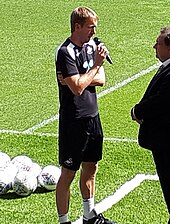Graham Potter: Difference between revisions
English footballer and manager (born 1975)
Graham Stephen Potter (born 20 May 1975) is an English professional football manager and former player who most recently managed Premier League club Chelsea.[3]
In a 13-year playing career, Potter, who played as a left-back, made 307 appearances in the Football League. He also played in the Premier League for Southampton and the Football Conference for Shrewsbury Town. At international level, he was capped once for England at under-21 level.
Potter started his professional managerial career in January 2011 with Swedish club Östersund. He won three promotions and the Svenska Cupen with Östersund, leading them to the 2017–18 UEFA Europa League knockout stage. He was appointed manager of Championship club Swansea City in June 2018, and moved on to Brighton & Hove Albion of the Premier League a year later. After a successful spell at Brighton, he was hired by Chelsea. He was relieved of his duties in April 2023, following a steep drop in form.
Playing career[edit]
Born in Solihull, West Midlands, Potter began his footballing career at the age of 17 as a trainee at Birmingham City.[1] After a loan spell at Wycombe Wanderers, the young left-back then moved on to Stoke City, then to Southampton in the Premier League,[4] where he played in the famous 6–3 win over Manchester United in 1996.[5] While a Southampton player, he was capped for England U21s in a European Championships qualifier against Moldova.[6]
He joined West Bromwich Albion in 1997, and after three-and-a-half years, which also included loan spells at Northampton Town and Reading, he signed for York City.[4] Potter moved from York City to Boston United in the summer of 2003.[7] Potter would go on to make over 100 appearances for York City, before joining Shrewsbury Town on loan in November 2003.[8] In the closing chapter of his playing career, in 2004, he moved on a free transfer to Macclesfield Town, where he finished his senior playing career.[4]
Coaching and managerial career[edit]
Early career[edit]
With support from the Professional Footballers’ Association, Potter graduated from the Open University in December 2005 with a degree in Social Sciences.[9] He worked as a football development manager for the University of Hull and as technical director for the Ghana women’s team at the 2007 FIFA Women’s World Cup.[10] He became assistant coach for the England Universities squad,[11] before joining Leeds Metropolitan University (now Leeds Beckett University) in a similar role; while at Leeds, he completed an MSc Leadership: Personal & Professional Development, which focused on using emotional intelligence.[12][13]
Leeds Carnegie[edit]
In 2008, Potter was appointed manager of Northern Counties East League Division One side Leeds Carnegie.[14] During his time at the club, Potter led the team to the third round of the FA Vase and third place in the 2009–10 Northern Counties East League season, before departing Leeds Carnegie on 12 January 2011.[15]
Östersund[edit]
“Quite often there’s no perfect situation that emerges. My situation, and my opportunity, was the fourth tier in Swedish football and a place that nobody really wanted to go to.”
—Potter, speaking in September 2022, on his decision to join Östersund.[16]
In December 2010, Potter signed a three-year contract as coach of Östersund, who were then playing in the fourth tier of Swedish football, starting on 24 January 2011.[17] Potter was offered the job after Graeme Jones, his friend and assistant to Roberto Martínez at Swansea City, recommended him to chairman Daniel Kindberg after Östersund’s pre-season friendly with Swansea.[18]
In 2013, after two successive promotions, Potter extended his contract with the club for another three years.[19] On 27 October 2015, Östersund secured promotion to the Swedish top flight, Allsvenskan, for the first time in their history following a second-place finish in the 2015 Superettan.[20] Östersund finished their debut season in eighth place, winning plaudits for their “slick passing game” and competing on a limited budget.[21][22]
On 13 April 2017, Potter’s Östersund team won the Svenska Cupen, beating Norrköping 4–1 in the final.[23] This granted the team a place in the second qualifying round of the 2017–18 UEFA Europa League where they defeated Galatasaray 3–1 on aggregate.[24] In the third round they defeated Fola Esch 3–1 on aggregate[25] and in the play-offs they knocked out PAOK (3–3 on aggregate with more away goals), thus securing a historic entry into the Europa League group stage.[26][21] They finished second in their group, level on points with Athletic Bilbao.[27] Despite beating Arsenal 2–1 at the Emirates Stadium, they were eliminated from the competition after losing 4–2 on aggregate.[28] Östersund finished their domestic league season in fifth place.[24]
Swansea City[edit]
Potter was appointed manager of newly relegated Championship club…
Read More: Graham Potter: Difference between revisions


